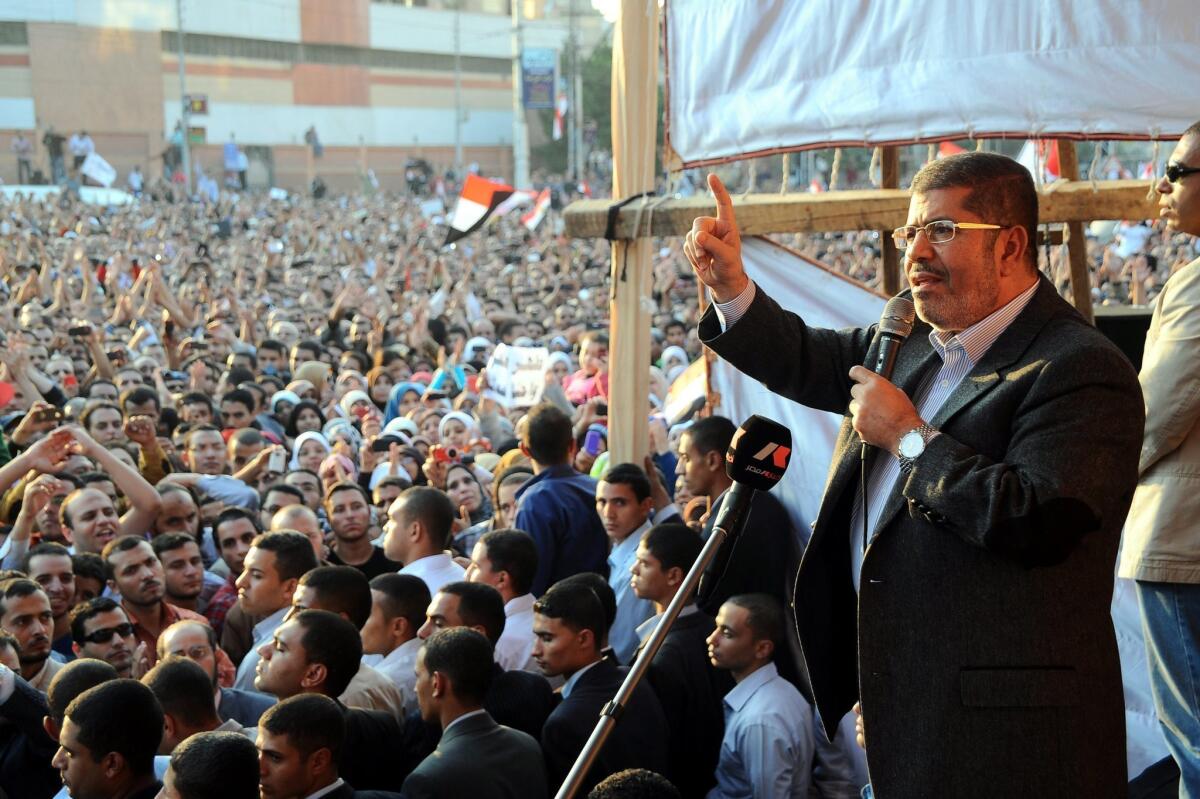An untidy compromise in Egypt

Egyptian President Mohamed Morsi overreached last week when he asserted near-dictatorial power under a “temporary” decree that placed his actions beyond judicial review. The move galvanized his political opponents, dismayed some of his supporters and jolted the Egyptian stock market — and on Monday, Morsi wisely retreated somewhat.
But Egypt’s Supreme Judicial Council also gave some ground by tacitly agreeing that the judiciary wouldn’t thwart the drafting of a new constitution, the scenario Morsi had apparently been seeking to avert with his decree. The result is an untidy compromise that preserves a measure of independence for the judiciary while giving force to the will of the electorate that installed the Islamist Morsi in power.
The crisis began Thursday when Morsi abruptly issued the order removing from judicial review “constitutional declarations, laws and decrees made by the president since he took office.” Lawsuits challenging Morsi’s actions, according to the decree, “are annulled” and the president was now free to “take the necessary actions and measures to protect the country and the goals of the revolution.”
Although Morsi said the decree would remain in effect only until the adoption of a new constitution and the election of a new lower house of parliament, its imperious language was reminiscent of the claims not only of Hosni Mubarak, the autocratic Egyptian president overthrown last year, but of tyrants the world over. The opposition figure and former head of the International Atomic Energy Agency Mohamed ElBaradei, accused Morsi of becoming a “new pharaoh,” protests erupted across the country, judges threatened to go on strike, and even Morsi’s own justice minister raised questioned about the decree. The U.S. State Department, which had profusely praised Morsi for his role in achieving a cease-fire between Israel and Hamas just a couple of days earlier, reminded him publicly that “one of the aspirations of the revolution was to ensure that power would not be overly concentrated in the hands of any one person or institution.” (Private comments were presumably more vociferous.) On Capitol Hill, Morsi’s decree inspired new talk of withholding U.S. aid from Cairo.
The protests had an effect. On Sunday, the Supreme Judicial Council conceded that some “acts of sovereignty” might not be subject to judicial review. Apparently that exception referred to directives dealing with the drafting of a new constitution. On Monday the New York Times reported that Morsi and the judges had agreed that the assembly now drafting a constitution wouldn’t be dissolved by the courts before it completes its work.
The problem, however, is that some Christian and secularist members of the assembly have refused to participate in the drafting of the constitution because of the dominance of the body’s Islamists. In his decree, Morsi extended the commission’s deadline for two months. During that time, he and his allies need to induce disaffected members of the body to rejoin the deliberations to ensure that the constitution that results protects the rights of women, Christians and secularists. If that isn’t the result, Morsi might face intervention from a powerful institution that has been quiescent in the most recent controversies — the Egyptian military.
More to Read
A cure for the common opinion
Get thought-provoking perspectives with our weekly newsletter.
You may occasionally receive promotional content from the Los Angeles Times.










